- Home
- Harlan Coben
Gone for Good (2002) Page 4
Gone for Good (2002) Read online
Page 4
"Armed robbery."
"Better," Squares said with a nod. He looked up at Fisher. "No conviction on that one, right?"
"That's correct."
"So maybe she didn't do it."
Fisher frowned again.
I plucked at my lower lip.
"Mr. Klein?"
"Can't help you," I said.
"Can't or won't."
I still plucked. "Semantics."
"This must all seem a little deja-vu, Mr. Klein."
"What the hell is that supposed to mean?"
"Covering up. First for your brother. Now your lover."
"Go to hell," I said.
Squares made a face at me, clearly disappointed with my admittedly lame retort.
Fisher didn't back off. "You're not thinking this through," she said.
"How's that?"
"The repercussions," she went on. "For example: How do you think the Covenant House donors would take it if you were arrested for, say, aiding and abetting?"
Squares took that one. "You know who you should ask?"
Claudia Fisher crinkled her nose at him, as if he were something she'd just scraped off her shoe.
"Joey Pistillo," Squares said. "I bet Joey would know."
Now it was Fisher and Wilcox's turn to rock back on their heels.
"You got a cell phone?" Squares asked. "We can ask him right now."
Fisher looked at Wilcox, then at Squares. "Are you telling us that you know Assistant Director in Charge Joseph Pistillo?" she asked.
"Call him," Squares said. Then: "Oh, wait, you probably don't know his private line." Squares stretched out his hand and wiggled his finger in a give-me gesture. "You mind?"
She handed him the phone. Squares pressed the number pad and put the phone to his ear. He leaned all the way back, his feet still on the desk; if he'd been wearing a cowboy hat, it'd be pulled down over his eyes for a little siesta.
"Joey? Hey, man, how are you?" Squares listened for a minute and then he burst out laughing. He schmoozed a bit and I watched Fisher and Wilcox turn white. Normally I'd enjoy this power play between his checkered past and current celebrity status, Squares was one degree of separation from almost everyone but my mind was reeling.
After a few minutes, Squares handed Agent Fisher the cell phone. "Joey wants to talk to you."
Fisher and Wilcox stepped out in the corridor and closed the door.
"Dude, the feds," Squares said, thumbs up again, still impressed.
"Yeah, I'm pretty thrilled," I said.
"That's something, huh. I mean, about Sheila having a record. Who'd have guessed?"
Not me.
When Fisher and Wilcox returned, the color had returned to their faces.
Fisher handed the phone to Squares with too courteous a smile.
Squares put it to his ear and said, "What's up, Joey?" He listened for a while. Then he said, "Okay," and hung up.
"What? "I said.
"That was Joey Pistillo. Top gun for the FBI on the East Coast."
"And?"
"He wants to see you in person," Squares said. He looked off.
"What?"
"I don't think we're going to like what he has to say."
Chapter Five.
Assistant Director in Charge Joseph Pistillo not only wanted to see me in person, but alone.
"I understand your mother passed away," he said.
"How do you understand?"
"Pardon?"
"Did you read the obituary in the paper?" I asked. "Did a friend tell you? How did you come to understand that she passed away?"
We looked at each other. Pistillo was a burly man, bald except for a close-cropped fringe of gray, shoulders like bowling balls, gnarled hands folded on his desk.
"Or," I went on, feeling the old anger creep in, "did you have an agent watching us. Watching her. At the hospital. On her deathbed. At her funeral. Was one of your agents the new orderly the nurses whispered about? Was one of your agents the limousine driver who forgot the funeral director's name?"
Neither one of us broke eye contact.
"I'm sorry for your loss," Pistillo said.
"Thank you."
He leaned back. "Why won't you tell us where Sheila Rogers is?"
"Why won't you tell me why you're looking for her?"
"When did you see her last?"
"Are you married, Agent Pistillo?"
He didn't break stride. "Twenty-six years. We have three kids."
"You love your wife?"
"Yes."
"So if I came to you and made demands and threats involving her, what would you do?"
Pistillo nodded slowly. "If you worked for the Federal Bureau of Investigation, I'd tell her to cooperate."
"Just like that?"
"Well" he raised his index finger "with one caveat."
"What's that?"
"That she was innocent. If she's innocent, I'd have no fears."
"So you wouldn't wonder what it was all about?"
"Wonder? Sure. Demand to know .. ." He let his voice trail off. "Let me ask you a hypothetical now."
He paused. I sat up.
"I know that you think your brother is dead."
Another pause. I stayed quiet.
"But suppose you found out that he's alive and hiding and suppose on top of that, you found out he killed Julie Miller." He sat back.
"Hypothetically, of course. This is all just a hypothetical."
"Go on," I said.
"Well, what would you do? Would you turn him in? Would you tell him he's on his own? Or would you help him?"
More silence.
I said, "You didn't bring me here to play hypotheti-cals."
"No," he said, "I didn't."
There was a computer monitor on the right side of his desk. He turned the screen so that I could see it. Then he pressed some buttons. A color image came up, and something inside me clenched.
An ordinary-looking room. Tall lamp in the corner overturned. Beige carpet. Coffee table on its side. A mess. Like a tornado aftermath or something. But in the center of the room, a man lay in a puddle of what I assumed was blood. The blood was dark, beyond crimson, beyond rust, almost black. The man lay faceup, his arms and legs splayed in such way that he looked like he'd been dropped from a great height.
As I looked at the image on the monitor, I could feel Pistillo's eyes on me, gauging my reaction. My eyes flicked to his and then back at the screen.
He pressed the keyboard. Another image replaced the blood-soaked one.
The same room. The lamp was out of sight now. Blood still stained the carpet but there was another body now, this one curled up in the fetal position. The first man wore a black T-shirt and black pants. This one wore a flannel shirt and blue jeans.
Pistillo hit another key. Now the photograph was wide framed. Both bodies now. The first in the center of the room. The second, closer to the door. I could see only one face from this angle it was not a familiar one but the other was blocked from view.
Panic rose up in me. Ken, I thought. Could one of them be .. . ?
But then I remembered their questions. This wasn't about Ken.
"These pictures were taken in Albuquerque, New Mexico, over the weekend," Pistillo said.
I frowned. "I don't understand."
"The crime scene was something of a mess, but we still found some hairs and fibers." He smiled at me. "I'm not great on the technical aspects of our work. They have tests nowadays that you simply can't believe.
But sometimes it's still the classics that get you through the day."
"Am I supposed to know what you're talking about?"
"Someone had wiped the place pretty good, but the crime-scene people still lifted a set of fingerprints one clean set that didn't belong to either of the victims. We ran them through the computer and got a hit early this morning." He leaned forward and the smile was gone now.
"You want to make a guess?"
I saw Sheila, my beautiful
Sheila, staring out the window.
"I'm sorry, Will."
"They belong to your girlfriend, Mr. Klein. The same one with a criminal record. The same one we're suddenly having a lot of trouble finding."
Chapter Six.
Elizabeth, New Jersey They were near the cemetery now.
Philip McGuane sat in the back of his handcrafted Mercedes limousine a stretch model equipped with armor-reinforced sides and bulletproof one-way windows at a cost of four hundred thou and stared out at the blur of fast-food restaurants, tacky stores, and aged strip malls. A scotch and soda, freshly mixed in the limo's wet bar, was cupped in his right hand. He looked down at the amber liquor. Steady. That surprised him.
"You okay, Mr. McGuane?"
McGuane turned to his companion. Fred Tanner was huge, the approximate size and consistency of a city brownstone. His hands were manhole covers with sausagelike fingers. His gaze was one of supreme confidence. Old school, Tanner was still with his shellac-shiny suit and the ostentatious pinky ring. Tanner always wore the ring, a garish, oversize gold thing, twisting and toying with it whenever he spoke.
"I'm fine," McGuane lied.
The limousine exited Route 22 at Parker Avenue. Tanner kept fiddling with the pinky ring. He was , a decade and a half older than his boss. His face was a weathered monument of harsh planes and right angles. His hair was meticulously mowed into a severe crew cut.
McGuane knew that Tanner was very good a cold, disciplined and lethal son of a bitch for whom mercy was about as relevant a concept as feng shui. Tanner was adept at using those huge hands or a potpourri of firearms. He had gone up against some of the crudest and had always come out on top.
But this, McGuane knew, was taking it to a whole new level.
"Who is this guy anyway?" Tanner asked.
McGuane shook his head. His own suit was a hand-tailored Joseph Abboud. He rented three floors on Manhattan's lower west side. In another era, McGuane might have been called a consigliore or capo or some such nonsense. But that was then, this is now. Gone (long gone, despite what Hollywood might want you to believe) were the days of backroom hangouts and velour sweats days Tanner undoubtedly still longed for. Now you had offices and a secretary and a computer-generated payroll. You paid taxes. You owned legit businesses.
But you were no better.
"And why we driving way out here anyway?" Tanner went on. "He should come to you, no?"
McGuane didn't reply. Tanner wouldn't understand.
If the Ghost wants to meet, you meet.
Didn't matter who you were. To refuse would mean that the Ghost would come to you. McGuane had excellent security. He had good people. But the Ghost was better. He had patience. He would study you. He would wait for an opening. And then he would find you. Alone. You knew that.
No, better to get it over with. Better to go to him.
A block away from the cemetery, the limousine pulled to a stop.
"You understand what I want," McGuane said.
"I got a man in place already. It's taken care of."
"Don't take him out unless you see my signal."
"Right, yeah. We've gone over this."
"Don't underestimate him."
Tanner gripped the door handle. Sunlight glistened off the pinky ring.
"No offense, Mr. McGuane, but he's just some guy, right? Bleeds red like the rest of us?"
McGuane was not so sure.
Tanner stepped out, moving gracefully for a man carrying such bulk.
McGuane sat back and downed a long swig of scotch. He was one of the most powerful men in New York. You don't get there you don't reach that pinnacle without being a cunning and ruthless bastard. You show weakness, you're dead. You limp, you die. Simple as that.
And most of all, you never back down.
McGuane knew all that knew it as well as anyone but right now, more than anything, he wanted to run away. Just pack what he could and simply disappear.
Like his old friend Ken.
McGuane met the driver's eyes in the rearview mirror. He took a deep breath and nodded. The car started moving again. They turned left and slid past the gates of Wellington Cemetery. Tires crunched loose gravel. McGuane told the driver to stop. The driver obeyed. McGuane stepped out and moved to the front of the car.
"I'll call you when I need you."
The driver nodded and pulled out.
McGuane was alone.
He pulled up his collar. His gaze swept over the graveyard. No movement. He wondered where Tanner and his man had hidden themselves.
Probably closer to the meet site. In a tree or behind a shrub. If they were doing it right, McGuane would never see them.
The sky was clear. The wind whipped him like a reaper's scythe. He hunched his shoulders. The traffic sounds from Route 22. spilled up over sound barriers and serenaded the dead. The smell of something freshly baked wafted in the still air and for a moment McGuane thought of cremation.
No sign of anyone.
McGuane found the path and headed east. As he passed the stones and markers, his eyes unconsciously checked birth and death dates. He calculated ages and wondered about what fate had befallen the young ones. He hesitated when he saw a familiar name. Daniel Skinner. Dead at age thirteen. A smiling angel had been sculpted into the tombstone.
McGuane chuckled softly at the image. Skinner, a vicious bully, had been repeatedly tormenting a fourth-grader. But on that day, May 11, according to the tombstone that rather unique fourth-grader had brought a kitchen knife for protection. His first and only thrust punctured Skinner's heart.
Bye, bye, Angel.
McGuane tried to shrug it off.
Had it all started here?
He moved on. Up ahead, he made a left and slowed his pace. Not far now. His eyes scanned the surroundings. Still no movement. It was quieter back here peaceful and green. Not that the inhabitants seemed to care. He hesitated, veered left again, and moved down the row until he arrived at the right grave.
McGuane stopped. He read the name and the date. His mind traveled back. He wondered what he felt and realized that the answer was, not much. He didn't bother looking around anymore. The Ghost was here somewhere. He could feel him.
"You should have brought flowers, Philip."
The voice, soft and silky with a hint of a lisp, chilled his blood.
McGuane slowly turned to look behind him. John Asselta approached, flowers in his hand. McGuane stepped away. Asselta's eyes met his, and McGuane could feel a steel claw reach into his chest.
"It's been a long time," the Ghost said.
Asselta, the man McGuane knew as the Ghost, moved toward the tombstone.
McGuane stayed perfectly still. The temperature seemed to drop thirty degrees when the Ghost walked past.
McGuane held his breath.
The Ghost knelt and gently placed the flowers on the ground. He stayed down there for a moment, his eyes closed. Then he stood, reached out with the tapered fingers of a pianist, and caressed the tombstone with too much intimacy.
McGuane tried not to watch.
The Ghost had skin like cataracts, milky and marsh-like. Blue veins ran down his almost-pretty face like dyed tear tracks. His eyes were shale, almost colorless. His head, too big for his narrow shoulders, was shaped like a lightbulb. The sides of his skull were freshly shaved, a sprout of mud-brown hairs sticking up from the middle and cascading out like a fountain. There was something delicate, even feminine, in his features a nightmare version of a Dresden doll.
McGuane took another step back.
Sometimes you meet a person whose innate goodness bursts at you with an almost blinding light. And then sometimes, you meet the direct opposite someone whose very presence smothers you in a heavy cloak of decay and blood.
"What do you want?" McGuane asked.
The Ghost lowered his head. "Have you heard the expression that there are no atheists in foxholes?"
"Yes."
"It's a lie, you know," the Ghost said. "
In fact, just the opposite is true. When you are in a foxhole, when you are face-to-face with death that is when you know for sure that there is no God. It's why you fight to survive, to draw one more breath. It's why you call out to any and every entity because you don't want to die. Because in your heart of hearts, you know that death is the end game No hereafter. No paradise. No God. Just nothingness."
The Ghost looked up at him. McGuane stayed still.
"I've missed you, Philip."
"What do you want, John?"
"I think you know."
McGuane did, but he said nothing.
"I understand," the Ghost continued, "that you are in something of a bind."
"What have you heard?"
"Just rumors." The Ghost smiled. His mouth was a thin razor slice, and the sight of it nearly made McGuane scream. "It's why I'm back."
"It's my problem."
"If only that were true, Philip."
"What do you want, John?"
"The two men you sent to New Mexico. They failed, correct?"
"Yes."
The Ghost whispered, "I won't."
"I still don't understand what you want."
"You would agree, would you not, that I have something of a stake in this too?"
The Ghost waited. McGuane finally nodded. "I guess you do."
"You have sources, Philip. Access to information I don't." The Ghost looked at the tombstone, and for a moment McGuane thought he saw something almost human there. "Are you sure he's back?"
"Fairly sure," McGuane said.
"How do you know?"
"Someone with the FBI. The men we sent to Albuquerque were supposed to confirm it."
"They underestimated thevr foe."
"Apparently."
"Do you know where he ran to?"
"We're working on it."
" But not very hard."
McGuane said nothing.
"You'd prefer that he vanish again. Am I right?"
"It'd make things easier."
The Ghost shook his head. "Not this time."
There was silence.
"So who would know where he is?" the Ghost asked.
"His brother perhaps. The FBI picked Will up an hour ago. For questioning."
That got the Ghost's attention. His head popped up. "Questioning about what?"
"We don't know yet."
"Then," the Ghost said softly, "that might be a good place for me to start."

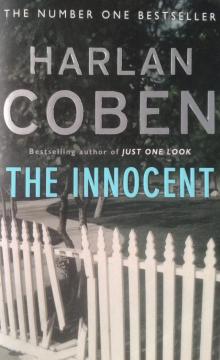 The Innocent
The Innocent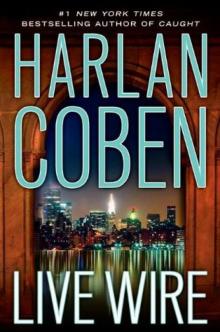 Live Wire
Live Wire Play Dead
Play Dead Drop Shot
Drop Shot Seconds Away
Seconds Away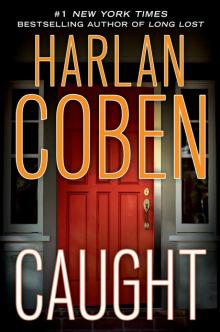 Caught
Caught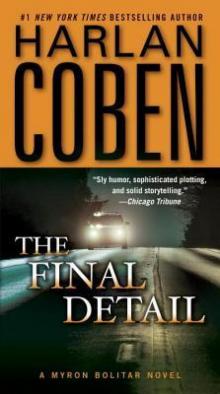 The Final Detail
The Final Detail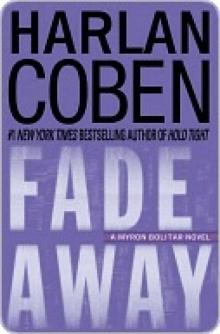 Fade Away
Fade Away Home
Home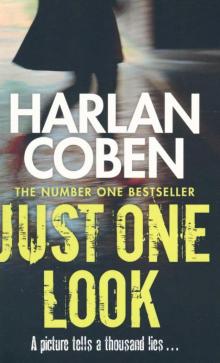 Just One Look
Just One Look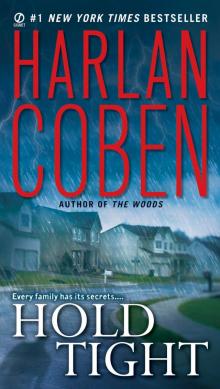 Hold Tight
Hold Tight Fool Me Once
Fool Me Once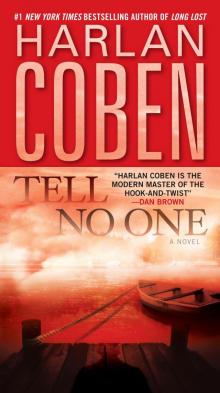 Tell No One
Tell No One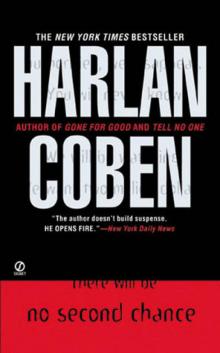 No Second Chance
No Second Chance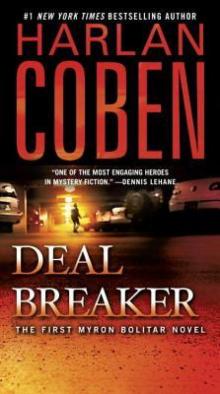 Deal Breaker
Deal Breaker Long Lost
Long Lost One False Move
One False Move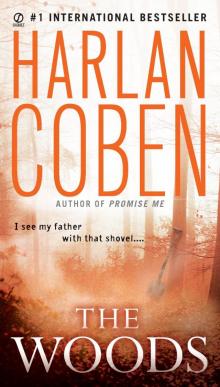 The Woods
The Woods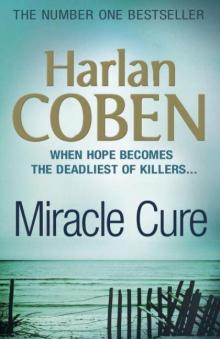 Miracle Cure
Miracle Cure Found
Found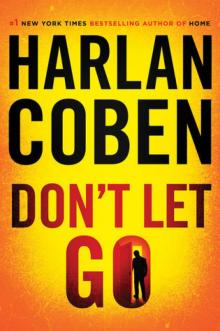 Don't Let Go
Don't Let Go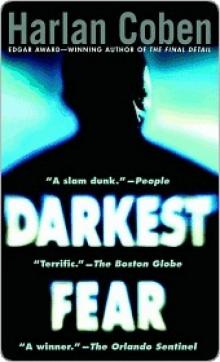 Darkest Fear
Darkest Fear The Stranger
The Stranger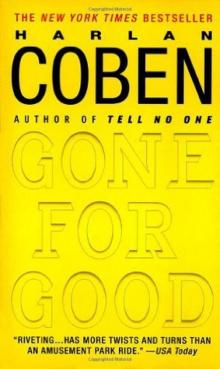 Gone for Good
Gone for Good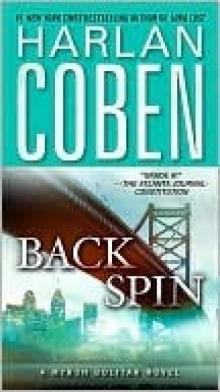 Back Spin
Back Spin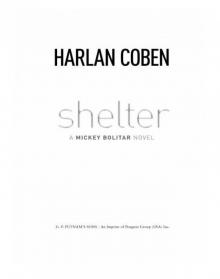 Shelter
Shelter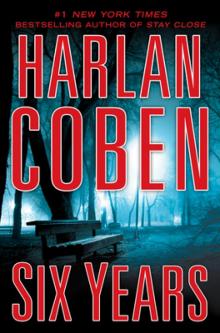 Six Years
Six Years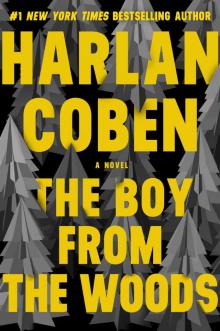 The Boy from the Woods
The Boy from the Woods Missing You
Missing You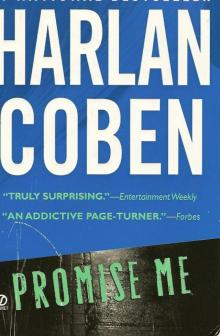 Promise Me mb-8
Promise Me mb-8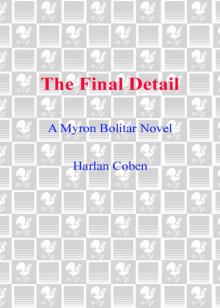 The Final Detail: A Myron Bolitar Novel
The Final Detail: A Myron Bolitar Novel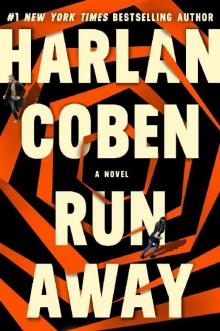 Run Away
Run Away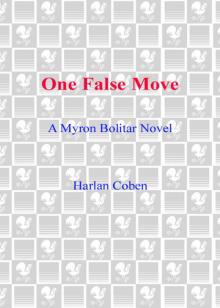 One False Move: A Myron Bolitar Novel
One False Move: A Myron Bolitar Novel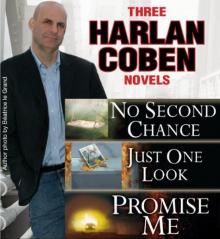 Three Harlan Coben Novels
Three Harlan Coben Novels the Woods (2007)
the Woods (2007) Tell No One (2001)
Tell No One (2001) the Innocent (2005)
the Innocent (2005)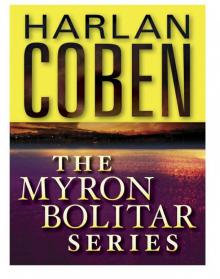 The Myron Bolitar Series 7-Book Bundle
The Myron Bolitar Series 7-Book Bundle Gone for Good (2002)
Gone for Good (2002) Caught (2010)
Caught (2010) Hold Tight (2008)
Hold Tight (2008)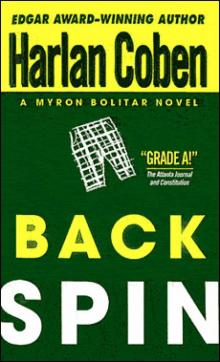 04 - Back Spin
04 - Back Spin Miracle Cure (1991)
Miracle Cure (1991)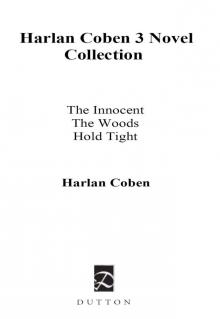 Harlan Coben 3 Novel Collection
Harlan Coben 3 Novel Collection Just One Look (2004)
Just One Look (2004)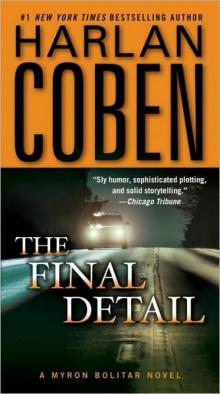 The Final Detail mb-6
The Final Detail mb-6 Play Dead (2010)
Play Dead (2010)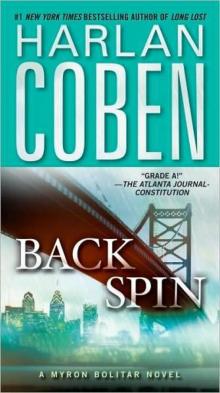 Back Spin mb-4
Back Spin mb-4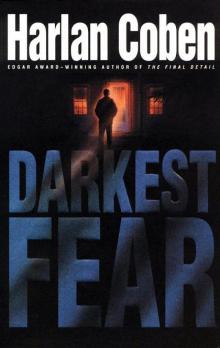 Darkest Fear mb-7
Darkest Fear mb-7